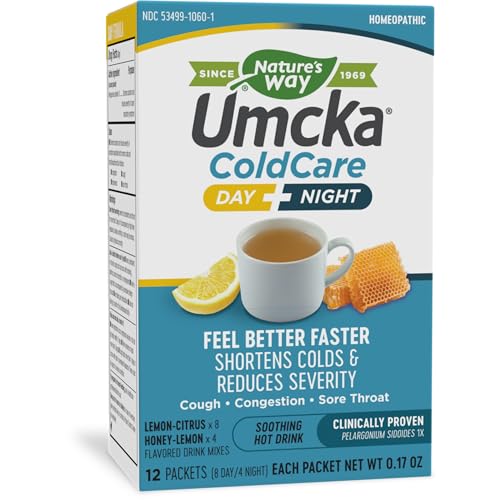
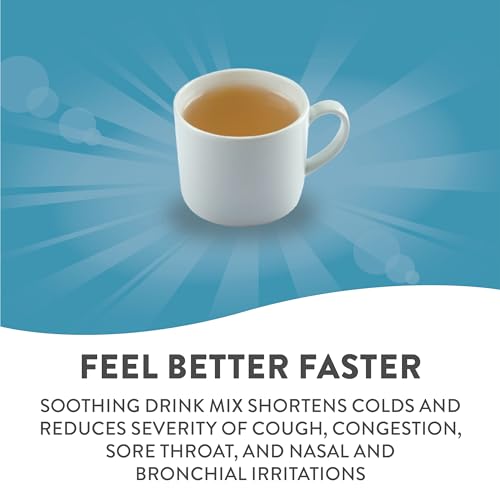
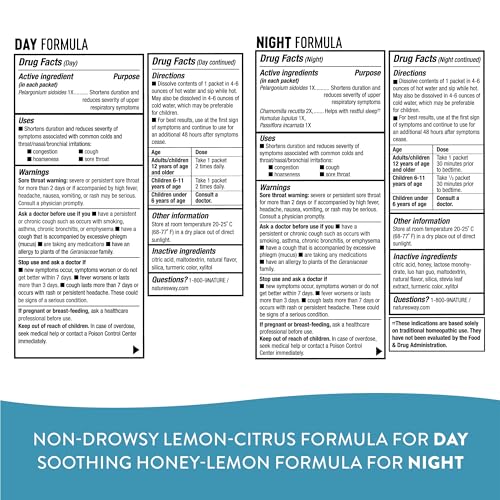

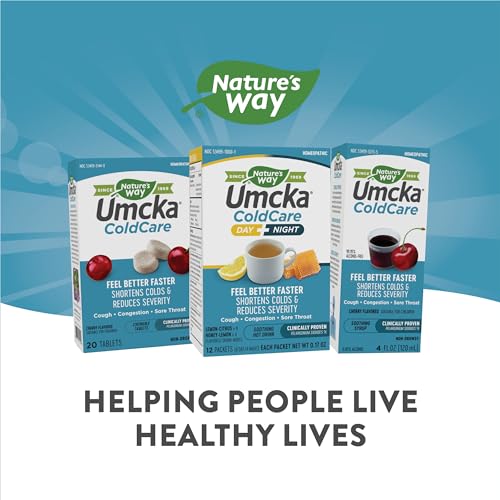
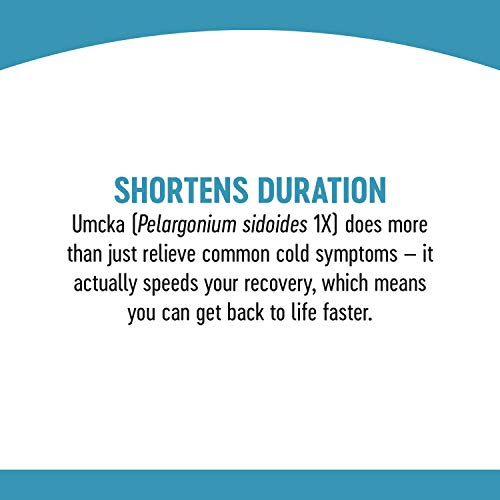
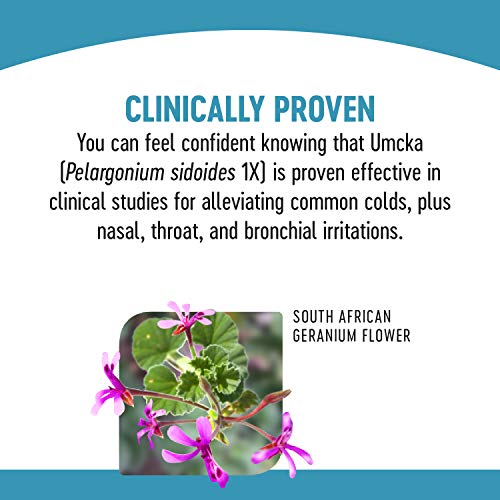
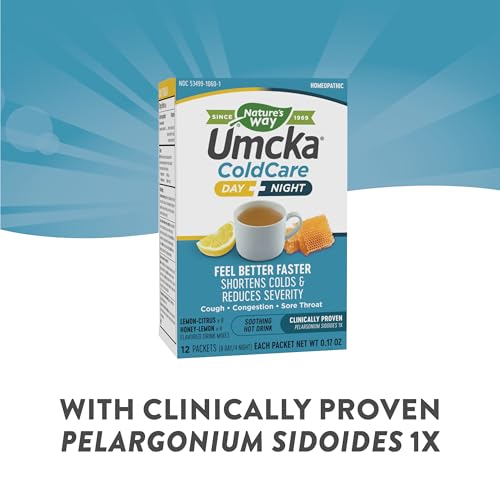
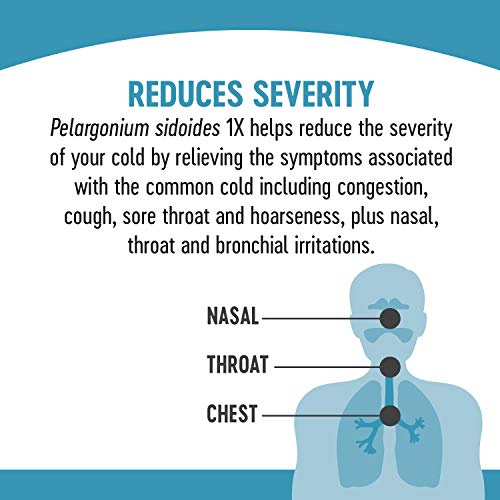
Nature's Way Umcka ColdCare Day+Night - Shortens Colds, Non-Drowsy, 12 Packets Hot Drink Mixes


Citric Acid
Medium RiskCitric acid is an alpha hydroxy acid used in personal care products primarily for its role as a pH adjuster and natural preservative. It occurs naturally in citrus fruits and is commonly utilized in various formulations for its chelating properties and mild exfoliation benefits.
Sustai Insights
Citric acid offers functional benefits as an effective preservative and pH stabilizer, contributing to product longevity and stability. It is biodegradable and derived from renewable sources. Health risks are low, with minimal concerns regarding carcinogenicity, allergies, and reproductive toxicity. However, moderate use restrictions exist due to potential irritation at high concentrations. Environmental risks are limited, as citric acid is not known to accumulate in ecosystems. Regulatory agencies have no significant advisories against its use. Overall, it is assessed as a medium-risk ingredient, with safe usage practices recommended and alternatives available.
Humulus Lupulus (Hops)
Medium RiskHumulus lupulus, commonly known as hops, is a flowering plant used primarily in brewing beer for flavoring and stability. Its components contribute to the bitterness and aroma of beer, while also acting as a natural preservative. Hops are also utilized in herbal medicine for their sedative properties.
Sustai Insights
Humulus lupulus offers functional benefits, such as flavor enhancement and preservation in food and beverages. While generally deemed safe, moderate concerns exist regarding its allergenic potential. It poses low risks of carcinogenicity and reproductive toxicity, with no significant environmental hazards noted. Regulatory bodies do not impose severe restrictions on hops, positioning it at a moderate risk level overall. Safe usage practices include ensuring proper sourcing and monitoring for allergens. Alternatives like other bittering agents may be considered for those with sensitivities. Overall, hops are a medium-risk ingredient.
Maltodextrin
Low RiskMaltodextrin is a saccharide material obtained from starch through partial hydrolysis. It is commonly used as a thickener, filler, or preservative in food and cosmetic products due to its ability to enhance texture and stability.
Sustai Insights
Maltodextrin serves as an effective thickener and stabilizer in various products, and it is typically derived from renewable sources. Health risks are minimal, as it poses low concerns for carcinogenicity, allergies, and developmental toxicity. Environmental impacts are also low, with no significant pollutant or bioaccumulation potential. Regulatory bodies do not impose major restrictions on its use. Overall, maltodextrin presents a low-risk profile, making it a widely accepted ingredient in food and cosmetic formulations.
Xylitol
Low RiskXylitol is a sugar alcohol used primarily as a sweetener. It is commonly found in oral care products and food items, offering a sweetening effect similar to sugar but with fewer calories. It serves as a humectant and can contribute to dental health by reducing the risk of cavities.
Sustai Insights
Xylitol provides functional benefits as a low-calorie sweetener and may help improve dental health by inhibiting cavity-causing bacteria. It is generally recognized as safe by the FDA with low concern for cancer, allergies, or reproductive toxicity. Environmental risks are minimal, as xylitol is biodegradable and does not accumulate in the ecosystem. Regulatory bodies have not imposed significant restrictions. Overall, xylitol presents a low risk when used appropriately, with no major adverse health effects reported and sustainable sourcing options available.
Honey
Low RiskHoney is a saccharic secretion gathered and stored by honeybees, primarily composed of sugars such as fructose and glucose. It is commonly used in cosmetic products for its humectant properties, helping to retain moisture and improve skin hydration.
Sustai Insights
Honey offers functional benefits such as moisturizing and soothing properties, contributing to skin care formulations. It has a low risk of health concerns, including potential allergenic reactions and endocrine disruption. Environmentally, honey is generally sustainable, being biodegradable and often sourced ethically. Regulatory bodies place low restrictions on its use, but it should be avoided by individuals with bee allergies. Overall, the ingredient presents a low risk profile for consumers.
Sand
Low RiskSand is loose, granular particles of worn or disintegrated rock, primarily composed of silica. It is commonly used as an abrasive, filler, or in construction and landscaping for its structural properties.
Sustai Insights
Sand offers functional benefits such as providing bulk and texture in various products, and it is generally considered to have low health risks, with minimal concerns regarding carcinogenicity, allergies, or reproductive toxicity. Environmentally, sand does not contribute significantly to pollution and is not bioaccumulative. Regulatory bodies do not impose restrictions on sand usage, maintaining its low-risk status. Safe usage practices should be followed to avoid inhalation of fine particles. Overall, sand is a low-risk ingredient with no notable negative impacts.
Citric Acid
Medium RiskCitric acid is an alpha hydroxy acid used in personal care products primarily for its role as a pH adjuster and natural preservative. It occurs naturally in citrus fruits and is commonly utilized in various formulations for its chelating properties and mild exfoliation benefits.
Sustai Insights
Citric acid offers functional benefits as an effective preservative and pH stabilizer, contributing to product longevity and stability. It is biodegradable and derived from renewable sources. Health risks are low, with minimal concerns regarding carcinogenicity, allergies, and reproductive toxicity. However, moderate use restrictions exist due to potential irritation at high concentrations. Environmental risks are limited, as citric acid is not known to accumulate in ecosystems. Regulatory agencies have no significant advisories against its use. Overall, it is assessed as a medium-risk ingredient, with safe usage practices recommended and alternatives available.
Maltodextrin
Low RiskMaltodextrin is a saccharide material obtained from starch through partial hydrolysis. It is commonly used as a thickener, filler, or preservative in food and cosmetic products due to its ability to enhance texture and stability.
Sustai Insights
Maltodextrin serves as an effective thickener and stabilizer in various products, and it is typically derived from renewable sources. Health risks are minimal, as it poses low concerns for carcinogenicity, allergies, and developmental toxicity. Environmental impacts are also low, with no significant pollutant or bioaccumulation potential. Regulatory bodies do not impose major restrictions on its use. Overall, maltodextrin presents a low-risk profile, making it a widely accepted ingredient in food and cosmetic formulations.
Xylitol
Low RiskXylitol is a sugar alcohol used primarily as a sweetener. It is commonly found in oral care products and food items, offering a sweetening effect similar to sugar but with fewer calories. It serves as a humectant and can contribute to dental health by reducing the risk of cavities.
Sustai Insights
Xylitol provides functional benefits as a low-calorie sweetener and may help improve dental health by inhibiting cavity-causing bacteria. It is generally recognized as safe by the FDA with low concern for cancer, allergies, or reproductive toxicity. Environmental risks are minimal, as xylitol is biodegradable and does not accumulate in the ecosystem. Regulatory bodies have not imposed significant restrictions. Overall, xylitol presents a low risk when used appropriately, with no major adverse health effects reported and sustainable sourcing options available.
Honey
Low RiskHoney is a saccharic secretion gathered and stored by honeybees, primarily composed of sugars such as fructose and glucose. It is commonly used in cosmetic products for its humectant properties, helping to retain moisture and improve skin hydration.
Sustai Insights
Honey offers functional benefits such as moisturizing and soothing properties, contributing to skin care formulations. It has a low risk of health concerns, including potential allergenic reactions and endocrine disruption. Environmentally, honey is generally sustainable, being biodegradable and often sourced ethically. Regulatory bodies place low restrictions on its use, but it should be avoided by individuals with bee allergies. Overall, the ingredient presents a low risk profile for consumers.
Sand
Low RiskSand is loose, granular particles of worn or disintegrated rock, primarily composed of silica. It is commonly used as an abrasive, filler, or in construction and landscaping for its structural properties.
Sustai Insights
Sand offers functional benefits such as providing bulk and texture in various products, and it is generally considered to have low health risks, with minimal concerns regarding carcinogenicity, allergies, or reproductive toxicity. Environmentally, sand does not contribute significantly to pollution and is not bioaccumulative. Regulatory bodies do not impose restrictions on sand usage, maintaining its low-risk status. Safe usage practices should be followed to avoid inhalation of fine particles. Overall, sand is a low-risk ingredient with no notable negative impacts.
Humulus Lupulus (Hops)
Medium RiskHumulus lupulus, commonly known as hops, is a flowering plant used primarily in brewing beer for flavoring and stability. Its components contribute to the bitterness and aroma of beer, while also acting as a natural preservative. Hops are also utilized in herbal medicine for their sedative properties.
Sustai Insights
Humulus lupulus offers functional benefits, such as flavor enhancement and preservation in food and beverages. While generally deemed safe, moderate concerns exist regarding its allergenic potential. It poses low risks of carcinogenicity and reproductive toxicity, with no significant environmental hazards noted. Regulatory bodies do not impose severe restrictions on hops, positioning it at a moderate risk level overall. Safe usage practices include ensuring proper sourcing and monitoring for allergens. Alternatives like other bittering agents may be considered for those with sensitivities. Overall, hops are a medium-risk ingredient.
Experience relief from cold symptoms with Nature's Way Umcka ColdCare Day+Night Homeopathic drink mix. This comforting hot beverage, available in refreshing Lemon-Citrus and Honey-Lemon flavors, is crafted from Pelargonium sidoides, a plant known for its soothing properties.
- Symptom Relief: Reduces severity of cold symptoms, including sore throat and cough, helping you feel better faster.
- Day/Night Formula: Non-drowsy daytime relief paired with a soothing nighttime formula for restful sleep.
- Quality Ingredients: Made from natural ingredients, free from phenylephrine, ensuring a gentle yet effective approach to cold care.
- Easy Preparation: Simply mix with hot water for a warm, comforting drink—perfect for any time of day.
- Homeopathic Solution: A trusted homeopathic remedy that empowers you to tackle cold symptoms naturally and effectively.
Nature's Way is committed to sustainable practices, ensuring that your health choice also supports the planet.
Subscribe & Save with Sustai
- Best Price Guarantee: Always enjoy the lowest prices on sustainable home essentials.
- No Surprises: We’ll notify you before shipping. No hidden fees, ever.
- You’re in Charge: Change, pause, or cancel your subscription anytime with ease.
- Eco-Friendly Deliveries: Our grouped shipments mean less packaging and lower emissions.
Join us on a sustainable journey. Special offers for a limited time! Prices and promotions may change.
Recommended Products
Experience relief from cold symptoms with Nature's Way Umcka ColdCare Day+Night Homeopathic drink mix. This comforting hot beverage, available in refreshing Lemon-Citrus and Honey-Lemon flavors, is crafted from Pelargonium sidoides, a plant known for its soothing properties.
- Symptom Relief: Reduces severity of cold symptoms, including sore throat and cough, helping you feel better faster.
- Day/Night Formula: Non-drowsy daytime relief paired with a soothing nighttime formula for restful sleep.
- Quality Ingredients: Made from natural ingredients, free from phenylephrine, ensuring a gentle yet effective approach to cold care.
- Easy Preparation: Simply mix with hot water for a warm, comforting drink—perfect for any time of day.
- Homeopathic Solution: A trusted homeopathic remedy that empowers you to tackle cold symptoms naturally and effectively.
Nature's Way is committed to sustainable practices, ensuring that your health choice also supports the planet.

You can have at most 2 Sustainable Steals products in your cart
Customer Reviews
Customers’ View
Customers appreciate the effectiveness and taste of the Cold Care Drink Mix, noting its ability to alleviate cold symptoms and provide soothing relief for sore throats. Many users report that it works quickly and helps them feel better, with one stating, 'this stuff really works, felt better the next day!' The product's natural ingredients are highlighted as a significant benefit, aligning with health-conscious values. Customers also enjoy the flavorful options, particularly the lemon varieties, which are described as 'not too sweet' and 'delicious.' While some feedback on product quality varies, the majority find it reliable and easy to use. Overall, this drink mix is viewed as an effective, natural remedy that supports wellness during cold season.
AI-generated from the text of customer reviewsThis product is rated 4.5 of 5.0 stars.
It has received 4 reviews.




